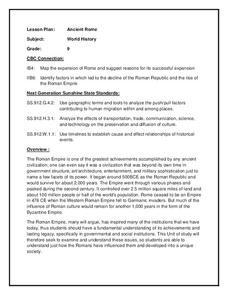National Endowment for the Humanities
Ending the War, 1783
The various peace proposals, made by both sides, to end the Revolutionary War come under scrutiny in this final lesson of a three-part series on the war. Class members read primary source documents and compare them with military...
National Endowment for the Humanities
The War in the South, 1778–1781
The second in a three-part look at the Revolutionary War focuses the years from 1778 through 1781 and zooms in on military operations in the southern colonies, the French alliance, and the role African-Americans played in events. Class...
National Endowment for the Humanities
The War in the North, 1775–1778
Using primary source documents, including maps, learners examine Revolutionary War events from 1775 to 1778. The focus here is on the challenges George Washington and the Continental army faced and how they persevered in spite of those...
National Endowment for the Humanities
The Rise and Fall of Joseph McCarthy
"I have here in my hand . . ." The war against Communism and Joseph McCarthy’s place in it are the focus of a series of lessons examining postwar America from 1945-1954. Joseph McCarthy takes center stage in this, the final lesson of the...
National Endowment for the Humanities
Soviet Espionage in America
The war against Communism and Joseph McCarthy’s place in it are the focus of a series of three lessons examining postwar America from 1945-1950. This first lesson asks groups to read an introduction that describes the Verona Project and...
BW Walch
Unexpected Family History
The history of the northern states' involvement in the slave trade is not widely known. This resource uses the PBS documentary, Traces of the Trade, and the nonfiction book, Children of the New England Slave Trade, to examine this aspect...
Teacher Web
1920's Magazine
What a creative and engaging project to incorporate into your studies of the 1920s! Your young historians will work in groups to design a magazine discussing the political and cultural topics of the decade, each member writing one...
Penn Museum
Africa
Mask wearing is not just for Halloween! This attractive and informative set of worksheets discusses this important African cultural tradition, as well as a variety of other significant cultural attributes to ancient civilizations, such...
Pulitzer Center
Revolution in Tunisia
How much do your pupils really know about the revolution in Tunisia? In order to inform your class and spark discussion, first create a country profile, comparing and contrasting Tunisia with the United States. Learners then analyze the...
Pulitzer Center
China's Rising Labor Movement
Young historians will explore the complex causes and effects of industrialization in China by perusing the numerous articles included in this webpage. Throughout the resource, there are many writing and discussion prompts to help direct...
Center for History Education
Debating Social Security: Understanding and Evaluating the Social Security Act of 1935
With throngs of Americans out of work and hungry, Franklin D. Roosevelt made the bold move to establish a social safety net with programs such as Social Security. The move was—and still is—controversial. Using documents from the 1930s,...
Center for History Education
The Freedmen's Bureau: Success or Failure?
What is freedom? The United States grappled with the question at the end of the Civil War after four million enslaved people were freed. Using circulars and images from the Reconstruction period, individuals examine how successful the...
Center for History Education
Daily Lives of Slaves - What Really Happened?
The stories of enslaved people are preserved forever thanks to the Great Depression. Budding historians explore slave narratives gathered by a federal government initiative to discover what life was actually like for enslaved people....
Curriculum Development Institute
Reconstruction and Development in Japan after WWII
After World War II, Japan faced the task of rebuilding—under the watchful eyes of the Allies. Using a dice game and creative discussion strategies, class members consider the challenges facing Japan and changes the country underwent...
iCivics
DBQuest: The Nashville Sit-In Movement
What was it like to be a part of the sit-ins during the Civil Rights Movement? Learners consider the question and whether the protests were effective using an online documents-based investigation. The program allows for virtual...
Eastconn
Learning to Analyze Political Cartoons with Lincoln as a Case Study
Discover the five main elements political cartoonists use—symbolism, captioning and labels, analogy, irony, and exaggeration—to convey their point of view.
Curated OER
Centers of the Storm: The Lyceum and the Circle at the University of Mississippi
Greek Revival architecture and the Civil Rights Movement? Sure! Examine how the Lyceum and Circle, two historic buildings located on the campus of the University of Mississippi, relate to integration and the 1962 riot on the university...
Miama-Dade County Public Schools
Ancient Rome
This resource outlines several general activities for a study of Ancient Rome, and includes guiding questions, a handout on the story of Romulus and Remus, and ideas for incorporating mapping and timeline activities into your review.



















